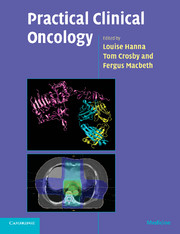Book contents
- Frontmatter
- Contents
- List of contributors
- Preface
- Acknowledgements
- Abbreviations
- 1 Practical issues in cytotoxic chemotherapy usage
- 2 Biological treatments in cancer
- 3 Hormones in cancer
- 4 Radiotherapy planning
- 5 Research in cancer
- 6 Oncological emergencies
- 7 Palliative care
- 8 Head and neck
- 9 Oesophagus
- 10 Stomach
- 11 Liver, gallbladder and biliary tract
- 12 Exocrine pancreas
- 13 Colon and rectum
- 14 Anus
- 15 Gastrointestinal stromal tumours
- 16 Breast
- 17 Kidney
- 18 Bladder
- 19 Prostate
- 20 Testis
- 21 Penis
- 22 Ovary
- 23 Body of the uterus
- 24 Cervix
- 25 Vagina
- 26 Vulva
- 27 Gestational trophoblast tumours
- 28 Lung
- 29 Mesothelioma
- 30 Soft tissue and bone tumours in adults
- 31 The lymphomas and myeloma
- 32 Central nervous system
- 33 Skin cancer other than melanoma
- 34 Melanoma
- 35 Thyroid
- 36 Neuroendocrine tumours
- 37 Cancer in children
- 38 Cancer of unknown primary
- 39 The use of radiotherapy in the treatment of benign conditions
- Multiple choice questions
- Multiple choice answers
- Index
- References
13 - Colon and rectum
Published online by Cambridge University Press: 23 December 2009
- Frontmatter
- Contents
- List of contributors
- Preface
- Acknowledgements
- Abbreviations
- 1 Practical issues in cytotoxic chemotherapy usage
- 2 Biological treatments in cancer
- 3 Hormones in cancer
- 4 Radiotherapy planning
- 5 Research in cancer
- 6 Oncological emergencies
- 7 Palliative care
- 8 Head and neck
- 9 Oesophagus
- 10 Stomach
- 11 Liver, gallbladder and biliary tract
- 12 Exocrine pancreas
- 13 Colon and rectum
- 14 Anus
- 15 Gastrointestinal stromal tumours
- 16 Breast
- 17 Kidney
- 18 Bladder
- 19 Prostate
- 20 Testis
- 21 Penis
- 22 Ovary
- 23 Body of the uterus
- 24 Cervix
- 25 Vagina
- 26 Vulva
- 27 Gestational trophoblast tumours
- 28 Lung
- 29 Mesothelioma
- 30 Soft tissue and bone tumours in adults
- 31 The lymphomas and myeloma
- 32 Central nervous system
- 33 Skin cancer other than melanoma
- 34 Melanoma
- 35 Thyroid
- 36 Neuroendocrine tumours
- 37 Cancer in children
- 38 Cancer of unknown primary
- 39 The use of radiotherapy in the treatment of benign conditions
- Multiple choice questions
- Multiple choice answers
- Index
- References
Summary
Introduction
Colorectal cancer (CRC) is second in incidence in Europe only to lung cancer, and it causes around 204,000 deaths each year. The aetiology of CRC is still unclear, but the eight- to ten-fold higher incidence in the developed world compared to that in the developing world suggests environmental causes. Around 15 to 20% of CRCs are of familial origin.
Screening is currently being adopted in the UK with the roll-out of a programme of faecal occult blood (FOB) testing, followed by colonoscopy if FOB testing is positive. Many other countries are also considering such a programme.
Surgery is the only curative treatment and total mesorectal excision (TME) is now well established as the best way of managing rectal carcinoma. But the last 10 years have also seen a rapid increase in the use of preoperative radiotherapy, of neoadjuvant and adjuvant chemotherapy, and of new agents for advanced disease, with small but incremental improvements in outcome.
Targeted therapy such as epithelial growth factor receptor (EGFR) inhibitors and vascular endothelial growth factor inhibitors have been tested in patients with advanced CRC, but the role of these therapies in routine management has not yet been established.
Types of colorectal tumours
The range of tumours that affect the colon and rectum is shown in Table 13.1.
Incidence and epidemiology
The annual incidence of CRC is 54 per 100,000 in the UK, and 35,000 new cases are reported per year (CRUK; http://info.cancerresearchuk.org, accessed September 2006).
- Type
- Chapter
- Information
- Practical Clinical Oncology , pp. 159 - 173Publisher: Cambridge University PressPrint publication year: 2008



